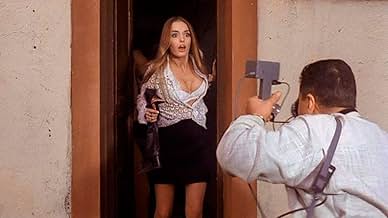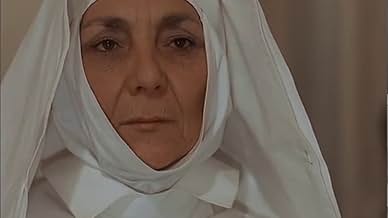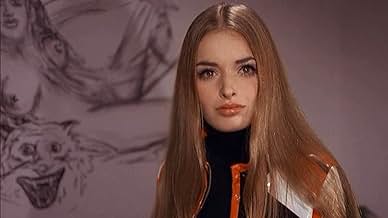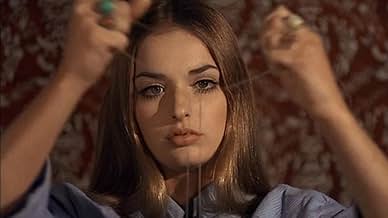Füge eine Handlung in deiner Sprache hinzuShortly after her release from a mental hospital, a young woman begins a campaign of revenge against those who placed her there.Shortly after her release from a mental hospital, a young woman begins a campaign of revenge against those who placed her there.Shortly after her release from a mental hospital, a young woman begins a campaign of revenge against those who placed her there.
Adrienne Larussa
- Licia
- (as Adrienne La Russa)
Alba Maiolini
- Nun
- (Nicht genannt)
Handlung
WUSSTEST DU SCHON:
- WissenswertesAfter an introductory section the English version casts the titles over Mario and Licia, cavorting with a camera, to a sing-songy nursery rhyme "Daddy, What is true?", a whiny complaint about Licia's daddy issues, which is then heard, insistently, ad nauseum, as the musical theme throughout the score. The Italian version, "Salvare la faccia," cuts the introductory scenes and opens with Mario and Licia, nude under the credits, kissing and caressing in close up, over an entirely different theme, "Love Your Neighbor as Yourself," which repeatedly repeats the aforesaid aphorism, followed, repeatedly, by the line "Kill them, alright! Kill them, alright!"
- PatzerWhen Licia arrives looking for Giovanna, her hair is up under a beret. Cut to her 2 sec. POV survey of the empty room, cut back to her, with her hair all combed out, and beret nowhere to be found.
- Zitate
Vocalist over opening credits: From my childhood I can't borrow. All I see is tears and sorrow. Yesterday, but no tomorrow. Daddy, what is true?
- Alternative VersionenAfter an introductory section the English version casts the titles over Mario and Licia, cavorting with a camera, to a sing-songy nursery rhyme "Daddy, What is true?", a whiny complaint about Licia's daddy issues, which is then heard, insistently, ad nauseum, as the musical theme throughout the score. The Italian version, "Salvare la faccia," cuts the introductory scenes and opens with Mario and Licia, nude under the credits, kissing and caressing in close up, over an entirely different theme, "Love Your Neighbor as Yourself," which repeatedly repeats the aforesaid aphorism, followed, repeatedly, by the line "Kill them, alright! Kill them, alright!"
- SoundtracksDaddy, What is True?
by Benedetto Ghiglia, lyrics by Jo Anna Kneeland
Ausgewählte Rezension
Obscure and unusual thriller starring the most effective American actress, Adrienne Larussa, who appeared in Fulci's great Perversion Story the same year. The male lead is famed Italian actor, Rossano Brazzi, who also here directs. It is a decent directorial effort but possibly the two roles made life a little difficult and there do seem to be moments where a little more clarity was needed. A little more thought might have been given to the soundtrack as well as one or two garish tunes seem to go round and round. Still, its a good story involving corruption in high places (what in Italy, surely not!) and a young women seeking revenge for an injustice done. Sex and violence a bit thin on the ground but Larussa's performance is so beguiling we are kept interested and amused throughout.
- christopher-underwood
- 8. Feb. 2013
- Permalink
Top-Auswahl
Melde dich zum Bewerten an und greife auf die Watchlist für personalisierte Empfehlungen zu.
- How long is Psychout for Murder?Powered by Alexa
Details
- Laufzeit1 Stunde 28 Minuten
- Sound-Mix
Zu dieser Seite beitragen
Bearbeitung vorschlagen oder fehlenden Inhalt hinzufügen

Oberste Lücke
By what name was Salvare la faccia (1969) officially released in Canada in English?
Antwort

























